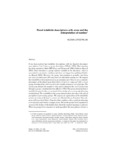Mostrar o rexistro simple do ítem
Plural indefinite descriptions with unos and the interpretation of number
| dc.contributor.author | López Palma, Helena | |
| dc.date.accessioned | 2018-02-05T08:44:39Z | |
| dc.date.available | 2018-02-05T08:44:39Z | |
| dc.date.issued | 2007-12-21 | |
| dc.identifier.citation | López Palma, Helena: Plural indefinite descriptions with unos and the interpretation of number. Probus 19, nº 2 (2007), p. 235-266 | es_ES |
| dc.identifier.issn | 0921-4771 | |
| dc.identifier.uri | http://hdl.handle.net/2183/20055 | |
| dc.description.abstract | [Abstract] It has been noticed that indefinite descriptions with the Spanish determiner unos (plural-“one”) have a group denotation (Villalta 1994). That meaning has been explained within DRT (Laca and Tasmowski 1996, Gutiérrez Rexach 2001). Unos introduces a group referent variable in the discourse, which is associated to an atomic condition and does not trigger box-splitting (Gutiérrez Rexach 2001). However, the group interpretation is unstable, and there are cases in which unos DPs may have an individual reading too. We suggest that instability is best understood as an epistemic fact. Unos is not a semantic determiner of the plural noun that follows it but it is composed with a covert group-denoting noun, which restricts the variable domain to sets of groups. The plural noun denotes the member’s class and is related to the covert group term through a group-constitute function (Barker 1992). The group interpretation is unstable because it relies on our implicit knowledge of a covert group-denoting nominal head. The variability in the group interpretation also shows the role of perception in processing groups. We propose an explanation of the instability of unos in terms of Kratzer’s version of a Skolem Choice Function. Unos denotes a Perspectival Choice Function that combines with a predicate denoting a set of groups and returns a unique group.We use the perspectival argument to represent the holder of the beliefs from which the implicit meaning is inferred. When the perspectival argument is underspecified, the unos-phrase denotes a fuzzy group, which we dub a cluster. When it is anchored to the speaker, the content of the cluster becomes transparent and the distributive reading of the group may arise. We extend the Spanish case to Galician and Catalan. | es_ES |
| dc.description.abstract | [Resumen] En este artículo se estudian los factores que desencadenan las interpretaciones de 'grupo' y 'distributiva' en descripciones plurales introducidos por el artículo indefinido "unos", y modelizamos "unos" como una función de elección perspectival. La lectura de 'grupo' de "unos" fue identificado por Villalta (1994) y ha sido explicado mediante un modelo discursivo (Gutiérrez Reixach 2001) que atribuye la lectura de grupo a que, supuestamente, "unos" introduce una variable con referencia de grupo en el discurso. Sin embargo, esta explicación tropieza con contra-ejemplos en los que "unos"+SN.PL tiene interpretación 'distributiva'. Consecuentemente este modelo no puede dar cuenta de tales datos de inestabilidad semántica. Proponemos un modelo alternativo en el que la inestabilidad en la interpretación de grupo de "unos" surge como un fenómeno epistémico. En nuestro modelo, "unos" contiene una categoría nominal vacía con referencia a variables de conjuntos de grupos. Una función de constitución de grupo (Barker 1992) vincula el nombre descriptivo léxico con la categoría vacía de 'grupo'. La interpretación de grupo es inestable porque depende de cómo procesamos los grupos. En nuestro modelo, "unos" denota una función de elección perspectival que se combina con un predicado nominal y da como resultado un único grupo. El argumento perspectival representa la creencia del hablante. Cuando el argumento perspectival no está especificado, el sintagma con "unos" denota un grupo borroso ("cluster"). Cuando está anclado con el hablante, el contenido del cluster se hace transparente, en cuyo caso puede darse la lectura 'distributiva' del grupo. | es_ES |
| dc.language.iso | eng | es_ES |
| dc.publisher | Walter De Gryter | es_ES |
| dc.relation.uri | https://doi.org/10.1515/PROBUS.2007.008 | es_ES |
| dc.subject | Perspectival choice function | es_ES |
| dc.subject | Fuzzy group | es_ES |
| dc.subject | Spanish determiner unos | es_ES |
| dc.subject | Función de elección perspectival | es_ES |
| dc.subject | Grupo borroso | es_ES |
| dc.title | Plural indefinite descriptions with unos and the interpretation of number | es_ES |
| dc.type | info:eu-repo/semantics/article | es_ES |
| dc.rights.access | info:eu-repo/semantics/openAccess | es_ES |
| UDC.journalTitle | Probus: International Journal of Romance Linguistics | es_ES |
| UDC.volume | 19 | es_ES |
| UDC.issue | 2 | es_ES |
| UDC.startPage | 235 | es_ES |
| UDC.endPage | 266 | es_ES |
Ficheiros no ítem
Este ítem aparece na(s) seguinte(s) colección(s)
-
UI-LN - Artigos [2]






